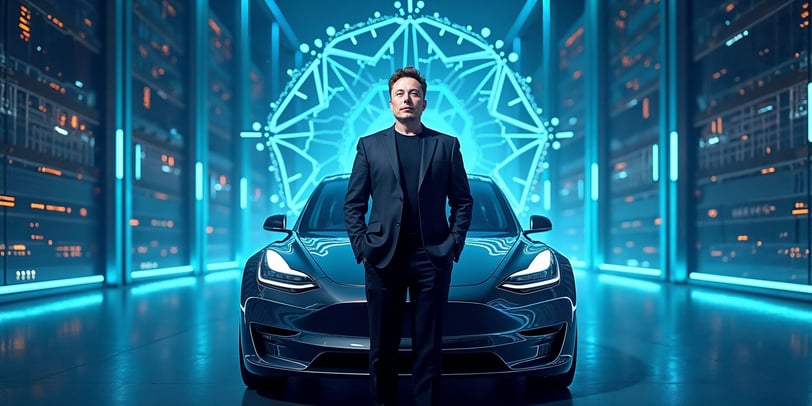How Elon Musk's Supercomputers Will Boost Tesla & xAI
Elon Musk's supercomputers, Dojo and Colossus, aim to power Tesla’s autonomous driving and xAI’s AI products, revolutionizing his businesses with AI innovation.
NEWS


Elon Musk is always pushing the boundaries of technology, and his latest venture into building supercomputers is no exception. As the CEO of Tesla and founder of the AI startup xAI, Musk has big ambitions for how artificial intelligence (AI) will power his businesses. His goal? To accelerate the development of Tesla’s autonomous driving and scale xAI's AI capabilities.
Musk's Vision for Tesla as an AI Company
Earlier this year, Musk tweeted that Tesla should be viewed as an AI and robotics company, rather than just a car manufacturer. This bold statement gives us insight into how Musk envisions the future of his businesses. Central to this transformation is Tesla's custom-built supercomputer, Dojo. Tesla has already committed $500 million to build Dojo in Buffalo, New York, and is also constructing another supercomputer cluster, Cortex, at its headquarters in Austin, Texas.
Dojo’s Role in Tesla's Autonomous Driving Revolution
Dojo will be critical for training Tesla’s AI models. By processing massive amounts of data and video footage collected from Tesla’s fleet of over 5 million vehicles, Dojo will improve Tesla’s Autopilot system and its Full Self-Driving (FSD) features. Tesla vehicles are equipped with multiple cameras, capturing thousands of miles of driving data every year, all of which is funneled back to Tesla for training its AI models.
Steven Dickens, chief technology advisor at the Futurum Group, explained it perfectly: “Each one of those cars has eight cameras. They’re driving around an average of 10,000 miles a year, streaming all that video back to Tesla. So, what can they do with that training set? Obviously, they can develop Full Self-Driving.”
But it's important to note, as Tesla states on its website, neither Autopilot nor FSD makes the cars fully autonomous yet, and both still require driver supervision. Despite this, Musk and Tesla are laser-focused on achieving full autonomy, a goal that many analysts believe is critical to Tesla's success. Tesla’s high market valuation, in large part, depends on the development of robotaxis.
Tesla vs. the Competition in Autonomous Driving
Tesla has faced challenges, particularly when it comes to autonomous driving. Other automakers like Alphabet's Waymo and GM's Cruise are already commercially operating autonomous taxis in U.S. cities. Chinese companies like Didi and Baidu are also making strides in the field.
However, Musk believes that Dojo, which has been up and running since 2023, could be a game changer. Tesla has postponed a planned robotaxi event from August to October, where more details on the future of Tesla’s autonomous ambitions may be revealed.
Beyond Cars: Dojo’s Role in Tesla’s Factories
Dojo won't just train AI models for Tesla’s vehicles. Musk has also announced that Tesla plans to deploy humanoid robots, known as Optimus, in its factories as early as next year. These robots will be trained using Dojo’s AI capabilities, further extending the supercomputer’s impact on Tesla’s operations.
Tesla is investing heavily in AI, with plans to spend $10 billion on AI development this year alone.
Musk’s AI Ambitions with xAI and the New Colossus Supercomputer
Beyond Tesla, Musk’s other AI venture, xAI, is also banking on supercomputers. Launched in 2023, xAI focuses on building large language models and other AI tools. Its flagship product is Grok, a chatbot designed to compete with similar AI tools from OpenAI, Microsoft, and Google.
Interestingly, Musk, who helped found OpenAI, left the organization in 2018 and has since become one of its most vocal critics. To train Grok, xAI is constructing a supercomputer called Colossus in Memphis, Tennessee. In early September, Musk revealed that Colossus was already partially online.
What’s Next for Musk’s Businesses?
With supercomputers like Dojo and Colossus, Musk is betting big on AI’s ability to transform Tesla and xAI. These systems will play a crucial role in advancing Tesla’s autonomous driving technology and scaling AI tools like Grok.
The tech world is watching closely as Musk continues to push boundaries. Whether it's revolutionizing autonomous driving with Tesla or competing in the AI space with xAI, his supercomputers will be the backbone of his plans for the future.
Stay tuned for more Elon Musk updates as he continues to reshape industries with AI-driven innovation!
